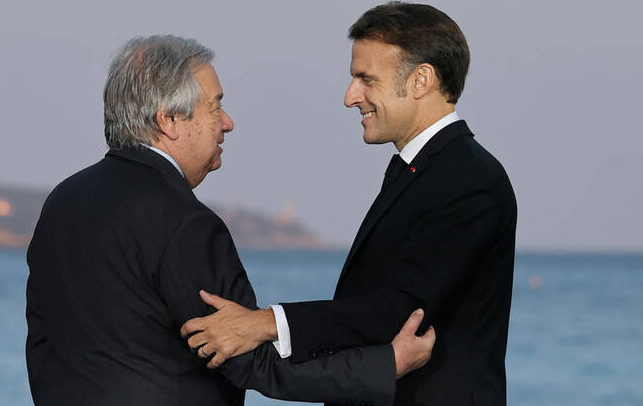
Guterres Urges Global Action to Prevent ‘Wild West’ in Deep Sea Governance
Guterres advises international leaders not to allow the deep sea to turn into a “wild west.”
At the opening of a global summit on the seas in France on Monday, United Nations Secretary General Antonio Guterres stated that the world should not allow the deepest oceans to “become the wild west.”
As states battle over controversial regulations on mining the seabed for vital minerals and the conditions of a worldwide pact on plastic waste, world leaders gather in Nice for the UN Ocean Conference.
US President Donald Trump has accelerated US exploration in foreign waters and circumvented international attempts to control the emerging industry, adding urgency to the deep-sea mining debate.
A worldwide mining code to control mining in the ocean depths is being discussed at a July meeting of the International Seabed Authority, which has jurisdiction over the ocean floor outside of national waters.
In his statement, Guterres asked governments to exercise caution as they traverse these “new waters on seabed mining” and expressed support for these conversations.
His statement, “The deep sea cannot become the wild west,” was met with cheers from the entire assembly.
Seabed mining is opposed by many governments, and France hopes that other countries in Nice will join a moratorium until the ecological effects of the practice are better understood.
“An international necessity” is how French President Emmanuel Macron described a moratorium on deep-sea mining.
“I think it’s madness to launch predatory economic action that will disrupt the deep seabed, disrupt biodiversity, destroy it and release irrecoverable carbon sinks when we know nothing about it,” the president of France stated.
In his follow-up speech, he declared that the deep sea, Greenland, and Antarctica were “not for sale” to roaring acclaim.
Without giving a timeframe, Macron declared that a global agreement to regulate the high seas was “a done deal” and had gotten enough ratifications to go into effect.
For the 2023 deal to become international law, 60 signatory nations had to ratify it. According to Macron, the necessary number “had been reached, which allows us to say that the high seas treaty will be implemented.”
Around 60 heads of state and government are set to join thousands of business executives, scientists, and civil society activists in Nice on Monday to make additional promises regarding ocean conservation.
The damaging fishing technique will be firmly on the summit agenda when the UK announces a partial ban on bottom trawling in half of its maritime protected areas on Monday.
In a recent documentary, British naturalist David Attenborough stunningly documented the process of bottom trawling, which involves dragging massive fishing nets across the ocean floor and sweeping up everything in their path.
“Long overdue” is how Greenpeace described the UK’s trawling announcement, which they welcomed. Environment organisations blasted Macron for not going far enough when he announced on Saturday that France would limit trawling in several of its marine protected areas.
Other nations will make “important announcements” on the establishment of new marine protected areas, French Environment Minister Agnes Pannier-Runacher said reporters on Sunday. This past week, Samoa took the lead by declaring that nine marine parks would be established to safeguard thirty percent of its national waterways. Despite a widely accepted goal of 30% coverage by 2030, just 8% of the world’s seas are set aside for marine conservation.
However, even fewer are thought to be fully protected because some nations have virtually no laws governing what is prohibited in maritime areas or do not have the resources to implement any laws. Ocean preservation is the least funded of the United Nations’ 17 sustainable development goals, and nations will be urged to contribute the missing funds.
Numerous small island states are anticipated to attend the summit and call for financial and political assistance to fight against the depletion of fish stocks, marine debris, and rising sea levels. Unlike a climate COP or treaty negotiation, the conference will not conclude with a legally enforceable accord.
However, if leaders stepped up, diplomats and other observers suggested it may be a much-needed turning point in ocean conservation worldwide. Enric Sala, the founder of the ocean conservation organisation Pristine Seas, stated, “The UN Ocean Conference gives us all an opportunity to turn words into bold and ambitious action.”


